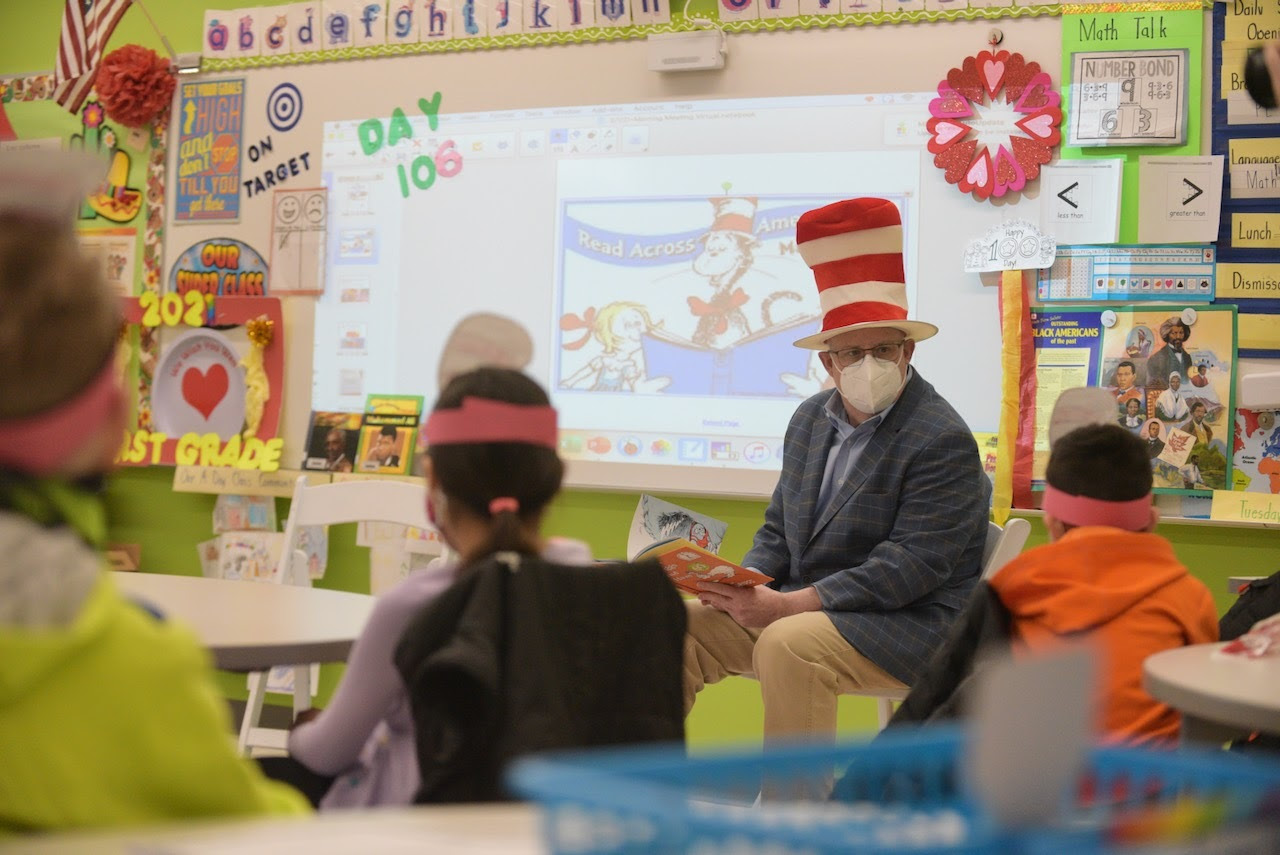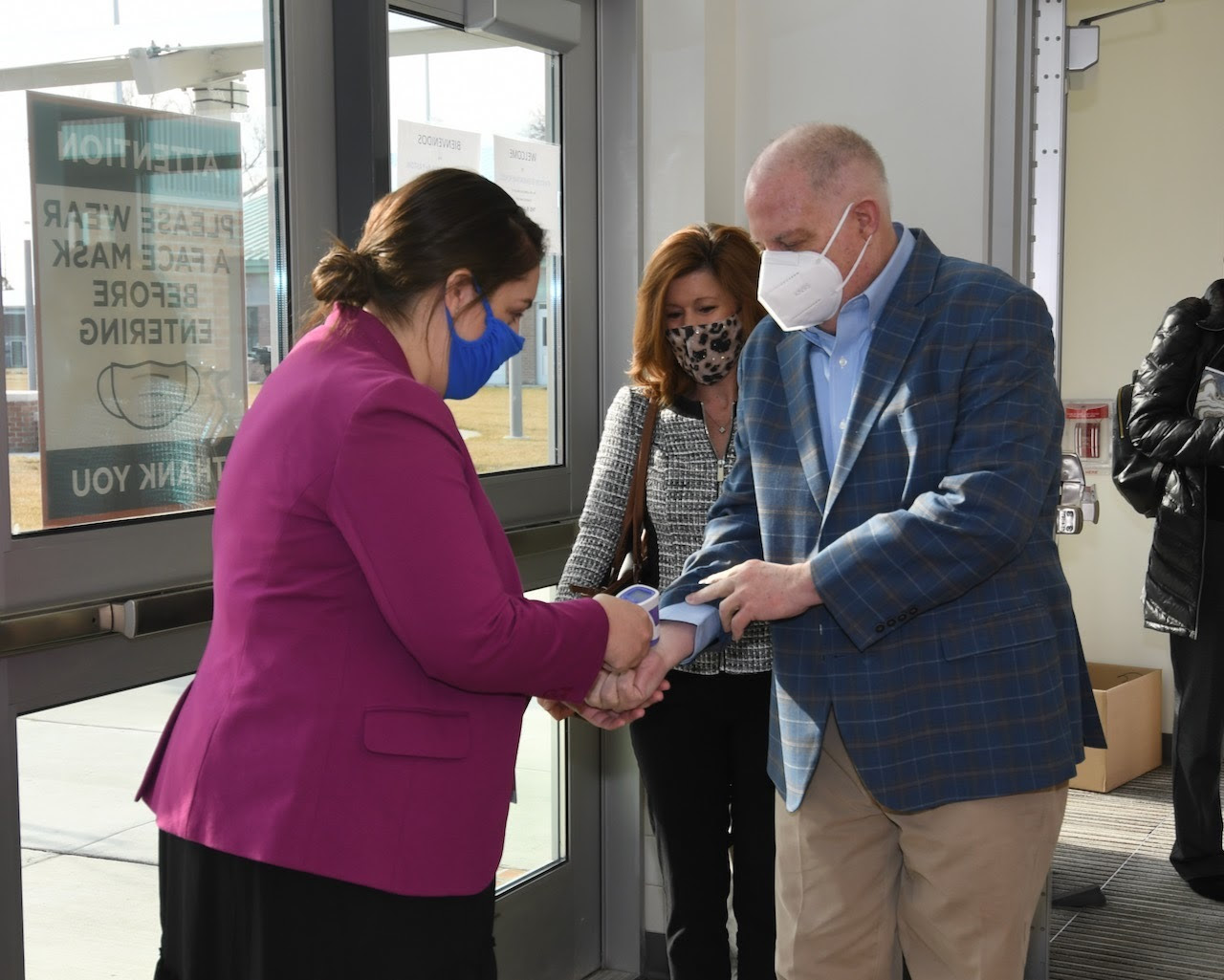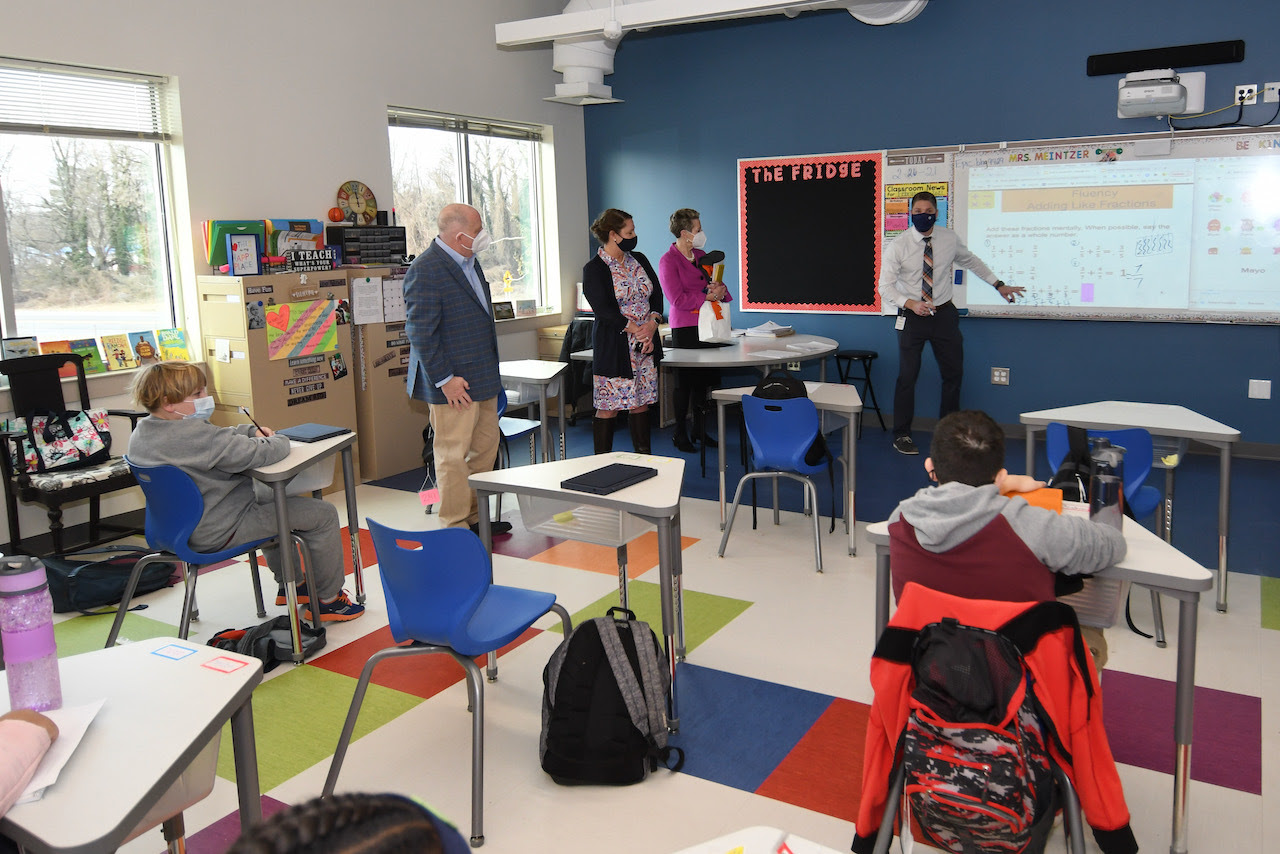ANNAPOLIS, MD—Governor Larry Hogan today joined State Superintendent Karen B. Salmon, Ph.D. for a visit to Easton Elementary School in Talbot County. With funding, guidance, and support from the Maryland State Department of Education and the Maryland Department of Health, schools across Maryland continue to reopen safely for in-person instruction.
“The State Superintendent and I have been strongly pushing school systems to get students safely back into the classroom by March, and we’re pleased that most systems will resume in-person instruction as of Monday,” said Governor Hogan. “I’m looking forward to visiting more school systems across the state in the coming weeks to thank all the teachers, staff, and administrators who have been working so hard to get our kids back into the classrooms.”

Governor Hogan again emphasized the public health mitigation practices in place to protect teachers, staff and students, including clarification of the school masking policy. The governor’s new executive order announced this week clarifies that masks are required for anyone over the age of 5 in any area of a school setting where interaction is likely, including all Maryland classrooms, cafeterias, hallways, auditoriums and gyms. In addition, throughout the spring, MSDE will deploy monitoring teams to support local systems to assist with evidence-based strategies to address learning loss, as well as resource allocation and management.

In addition to distributing more than $1.2 billion in emergency education funding, the state has supported school systems by improving device dissemination, enhancing platforms for virtual learning, expanding connectivity, and providing needed resources to support the safe reopening of school buildings.
“MSDE, in collaboration with local school systems, has redefined education by providing research-driven guidance, funding, personal protective equipment, a first-term school year 20-21 performance dashboard, learning-loss recovery strategies and COVID-19 testing in schools,” said Dr. Salmon. “It’s great to be back in classrooms, and we will continue to review statewide strategies to improve student outcomes across the state as we continue in our recovery efforts.”

To address learning loss, MSDE will continue to provide guidance in applying evidence-based strategies such as high-intensity tutoring services, extended summer learning programs, social-emotional learning, targeted academic acceleration to further mitigate the impacts of learning loss and resource allocations. Additionally, MSDE continues to provide guidance to local school systems in technical assistance sessions with leadership across the state as well as virtual learning professional development opportunities for educators.
Other major initiatives include:
Continuity of learning and emergency meals: During the first days of the pandemic, MSDE directed the provision of emergency school meals to ensure students’ nutritional needs were met. MSDE is especially grateful for the work of food service professionals, who have provided more than 45 million emergency meals. MSDE provided guidance for continuity of learning, reviewed policy, issued needed waivers and hosted virtual learning professional development for educators across the state.
Child Care and Early Education Support: MSDE addressed the safe reopening of child care facilities, gradually restoring capacity to licensure standards as outlined in Maryland’s Child Care Recovery Plan. During the initial phases of the pandemic, MSDE created and funded a more than $90.7 million essential employee child care program. Additionally, MSDE is providing a $60 million grant program to support eligible child care programs throughout the state to help meet operating costs and address lost revenue.
Personal protective equipment: The state has provided school systems with two million masks and 200,000 face shields, as well as hand sanitizer, gloves, and gowns.
Prioritization of Education Staff for Vaccines: MSDE requested that the state prioritize teachers and education staff to receive COVID-19 vaccinations in the phase for essential workers. School systems are working together with local health departments to vaccinate staff.
Maryland K-12 COVID-19 Testing Program: The COVID-19 Testing Task Force, Maryland Department of Health (MDH), and MSDE have developed a K-12 Testing Program to provide free COVID-19 tests for both public and non-public schools across the state who choose to participate. This program is an additional tool to support COVID-19 safety measures in schools that are already open, or plan to reopen in March for the remainder of the school year.
School Reopening Video: With Baltimore City and Carroll County Public Schools currently open for in-person instruction, MSDE produced a new video featuring Walter P. Carter Elementary/Middle School in Baltimore City and Robert Moton Elementary School in Westminster. It emphasizes the efforts of Principals Brandon Pinkney and Darryl Robbins and school staff, who are partnering to implement public health safety features throughout the building. The video features safety precautions such as proper social distancing on school buses, in hallways, and in classrooms, and the importance of practices such as hand washing, sanitizing, air purifiers, and constant mask wearing. Other systems highlighted in the video include Worcester, Caroline and Dorchester counties. Watch the video.
“The State Superintendent and I have been strongly pushing school systems to get students safely back into the classroom by March, and we’re pleased that most systems will resume in-person instruction as of Monday,” said Governor Hogan. “I’m looking forward to visiting more school systems across the state in the coming weeks to thank all the teachers, staff, and administrators who have been working so hard to get our kids back into the classrooms.”

Governor Hogan again emphasized the public health mitigation practices in place to protect teachers, staff and students, including clarification of the school masking policy. The governor’s new executive order announced this week clarifies that masks are required for anyone over the age of 5 in any area of a school setting where interaction is likely, including all Maryland classrooms, cafeterias, hallways, auditoriums and gyms. In addition, throughout the spring, MSDE will deploy monitoring teams to support local systems to assist with evidence-based strategies to address learning loss, as well as resource allocation and management.

In addition to distributing more than $1.2 billion in emergency education funding, the state has supported school systems by improving device dissemination, enhancing platforms for virtual learning, expanding connectivity, and providing needed resources to support the safe reopening of school buildings.
“MSDE, in collaboration with local school systems, has redefined education by providing research-driven guidance, funding, personal protective equipment, a first-term school year 20-21 performance dashboard, learning-loss recovery strategies and COVID-19 testing in schools,” said Dr. Salmon. “It’s great to be back in classrooms, and we will continue to review statewide strategies to improve student outcomes across the state as we continue in our recovery efforts.”

To address learning loss, MSDE will continue to provide guidance in applying evidence-based strategies such as high-intensity tutoring services, extended summer learning programs, social-emotional learning, targeted academic acceleration to further mitigate the impacts of learning loss and resource allocations. Additionally, MSDE continues to provide guidance to local school systems in technical assistance sessions with leadership across the state as well as virtual learning professional development opportunities for educators.
Other major initiatives include:
Continuity of learning and emergency meals: During the first days of the pandemic, MSDE directed the provision of emergency school meals to ensure students’ nutritional needs were met. MSDE is especially grateful for the work of food service professionals, who have provided more than 45 million emergency meals. MSDE provided guidance for continuity of learning, reviewed policy, issued needed waivers and hosted virtual learning professional development for educators across the state.
Child Care and Early Education Support: MSDE addressed the safe reopening of child care facilities, gradually restoring capacity to licensure standards as outlined in Maryland’s Child Care Recovery Plan. During the initial phases of the pandemic, MSDE created and funded a more than $90.7 million essential employee child care program. Additionally, MSDE is providing a $60 million grant program to support eligible child care programs throughout the state to help meet operating costs and address lost revenue.
Personal protective equipment: The state has provided school systems with two million masks and 200,000 face shields, as well as hand sanitizer, gloves, and gowns.
Prioritization of Education Staff for Vaccines: MSDE requested that the state prioritize teachers and education staff to receive COVID-19 vaccinations in the phase for essential workers. School systems are working together with local health departments to vaccinate staff.
Maryland K-12 COVID-19 Testing Program: The COVID-19 Testing Task Force, Maryland Department of Health (MDH), and MSDE have developed a K-12 Testing Program to provide free COVID-19 tests for both public and non-public schools across the state who choose to participate. This program is an additional tool to support COVID-19 safety measures in schools that are already open, or plan to reopen in March for the remainder of the school year.
School Reopening Video: With Baltimore City and Carroll County Public Schools currently open for in-person instruction, MSDE produced a new video featuring Walter P. Carter Elementary/Middle School in Baltimore City and Robert Moton Elementary School in Westminster. It emphasizes the efforts of Principals Brandon Pinkney and Darryl Robbins and school staff, who are partnering to implement public health safety features throughout the building. The video features safety precautions such as proper social distancing on school buses, in hallways, and in classrooms, and the importance of practices such as hand washing, sanitizing, air purifiers, and constant mask wearing. Other systems highlighted in the video include Worcester, Caroline and Dorchester counties. Watch the video.
–###-
